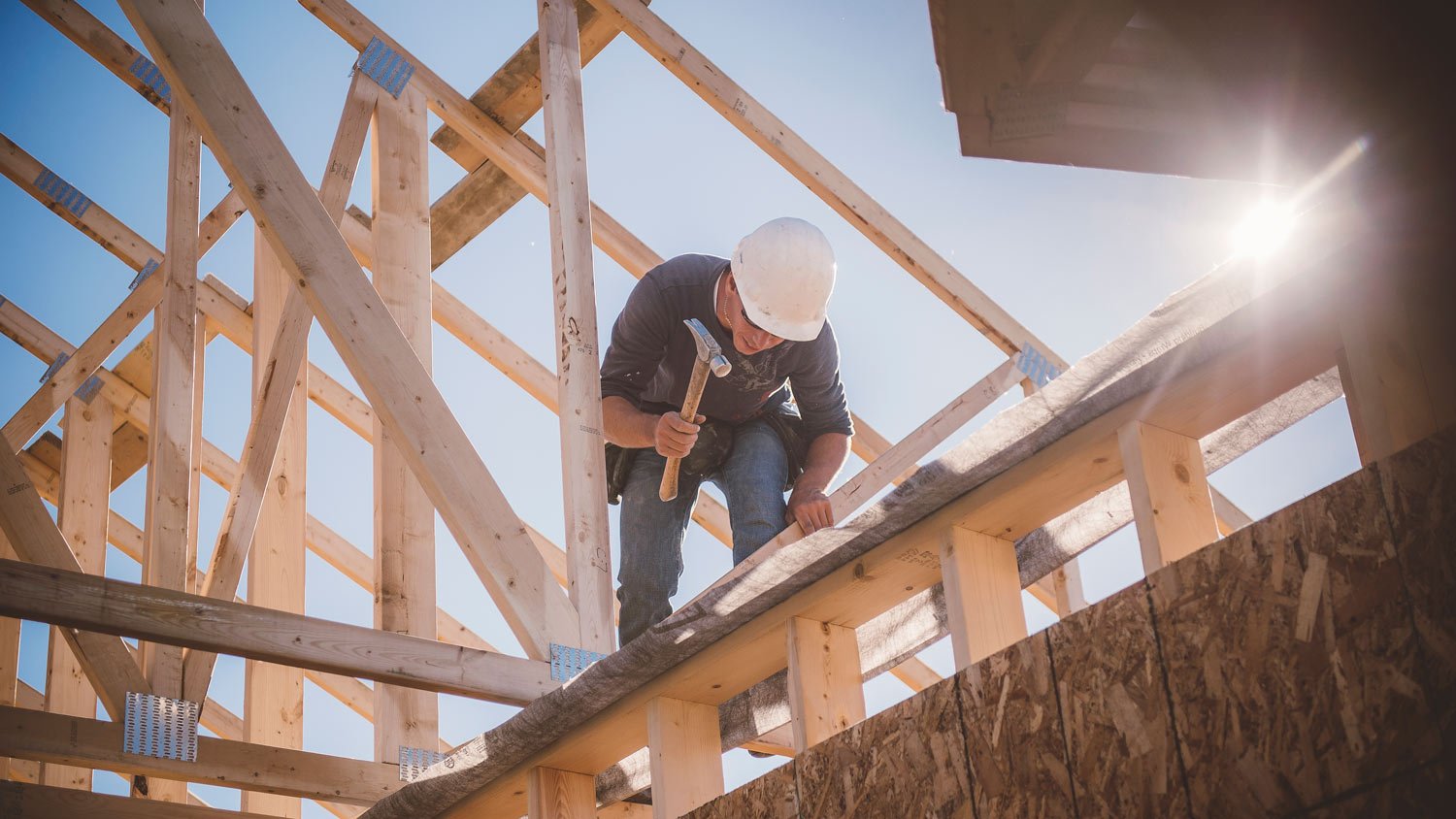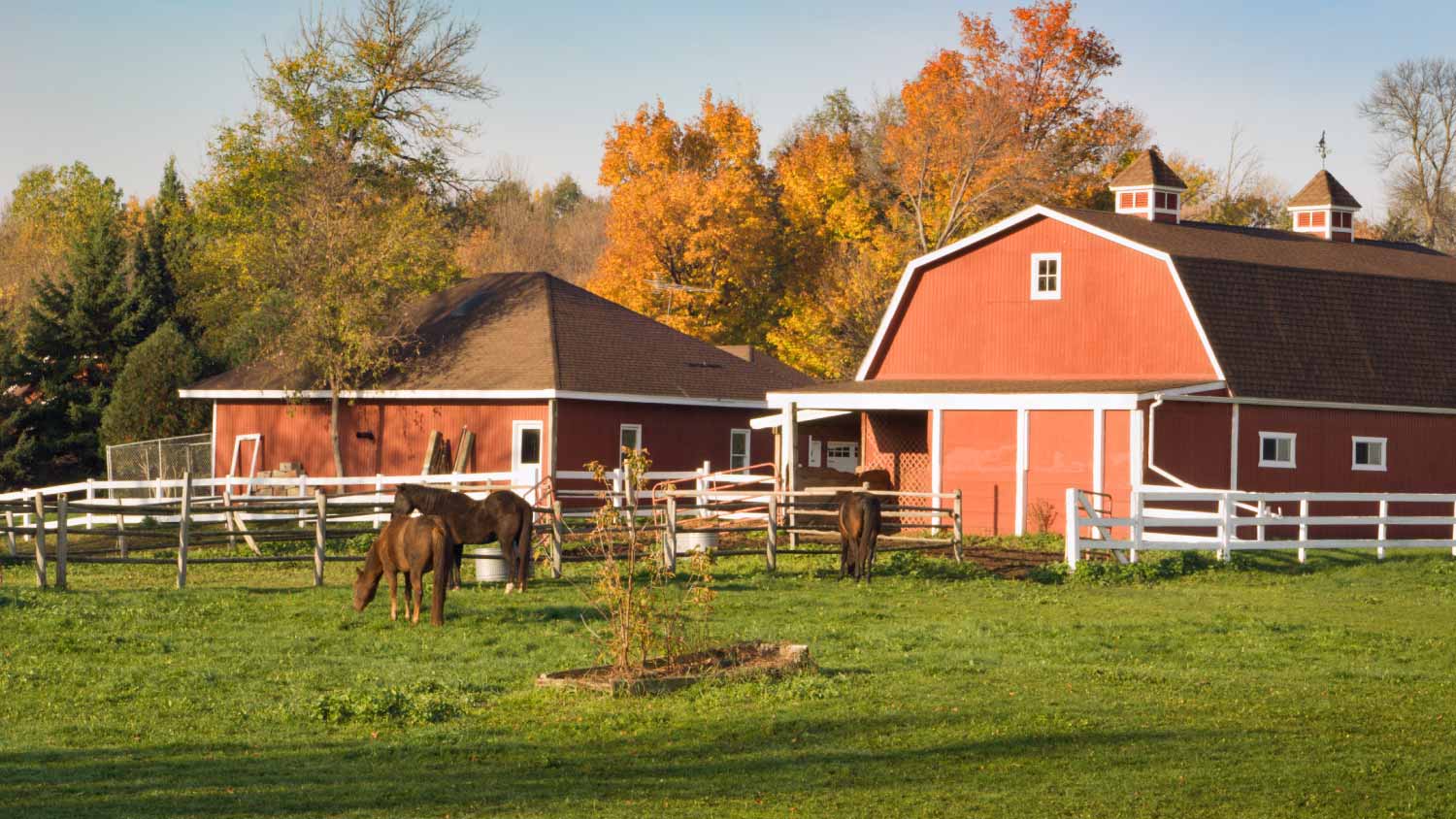
Having a dedicated space to retire after a day in the pool may seem like a pipe dream. Learn about pool house costs to see if you can make that dream a reality.
Block out the better part of a year to get your home on its feet


The average time to build a house ranges from seven to 14 months.
The length of a house build can vary based on location, building regulations, and supply availability.
Building timelines are also affected by who designs and builds the house.
Custom homes will take twice as long from start to finish.
The idea of building a house might sound appealing—after all, if you build your home from scratch, you can outfit it with the latest features and make sure everything is to your liking.
Although it has many perks, it’s also important to know that building a house is a big time commitment, from planning and permitting to the finishing touches. Let’s take a look at how long it takes to build a house and what can affect your timeline.
Building a home is an involved process, and it normally takes seven to 14 months to complete. According to the U.S. Census Bureau, in 2024, it took an average of 7.7 months to build a new home from start to completion, with built-for-sale homes taking an average of just over 6 months to complete and owner-built homes taking nearly 14 months.
Each stage of construction adds to the timeline, and how long your home takes to build can depend on what’s involved during the different planning and construction phases.
The pre-construction phase includes initial planning and permitting, and together, these take anywhere from two months to a year. Building a spec home instead of a custom home will go much more quickly in this phase because your builder will already have plans dialed in and permits ready to go. Building a custom home means working with an architect, a structural engineer, and other professionals who can take your vision and make it a buildable reality.
An architect costs an average of $6,500 but will often charge a percentage of the total project determined during this phase. You’ll be dreaming big (and then adjusting your expectations) during this phase to get a better sense of what you want for each part of your house and what it will look like.
After the design phase, you’ll be in the permits phase. In some cases, getting proper approvals and permits can take a lot of time, so it’s better to plan ahead. Some municipalities may be able to view and approve your permits in just two to four weeks. More likely, they’ll be backed up to some extent, and the permitting process will take 4 to 6 weeks.
Get all the necessary permits for your project as early as possible to avoid construction delays. Talk to your contractors about what permits are required and who needs to pull them.
Once your team has the green light to break ground, the construction stage begins. In total, this part of the process will take four months to a year, but custom builds can take even longer than that, depending on the complexity.
Before the builder starts work on your home, they must prepare the land. That means clearing trees and rocks, and rough grading and leveling for the foundation. For basement and crawl space foundations, your professional will also do some excavation.
Then, your team of pros will build concrete forms and pour the foundation. The timeline can shift depending on the size of the foundation and how long it needs to cure, which varies based on temperature and humidity. Assume that this early stage will take one to two weeks in most cases, but it’s not uncommon for it to take up to a month.
Once the concrete is completely dry, the next step is building your house's frame, starting with the exterior walls, floors, and roof rafters and then moving on to sheathing, which your pro will apply to the walls and roof. Expect an additional inspection at the end of this stage as well.
After the building crew completes the frame, they can start working on siding, roofing, wiring, and setting up plumbing and HVAC pipes and ductwork. Pros can also install water heaters and the heating and cooling systems at this stage. Not only does this part of the process take a large team of specialized contractors, but it will also require another inspection to ensure everything meets local codes.
Next, builders will cover the interior walls and ceilings with drywall or plasterboard, then sand and prime them. After that, you or any painters you hire can paint the walls.
Builders will then install the flooring, doors, windows, trim, and other interior finishes. Functional and decorative installations such as bathroom fixtures, cabinets, countertops, and doorknobs all go into place.
The last step is finishing the exterior facade. Pros will install any exterior finishes such as siding, landscaping, and hardscaping. By the end of this part of the construction phase, your new house is move-in ready!

Many things can affect the time to build a house, and a few different obstacles can cause it to take more time than you expect. Knowing these factors will help you streamline the process and avoid home-building delays.
Hiring skilled builders is one of the main factors that can make or break your home construction timeline. A reputable and experienced homebuilder often takes less time to complete your new home and will likely make fewer mistakes than you would on your own.
The time it takes to get permits from your local building department may vary. If you come across any issues, such as zoning or property line disputes, it’s likely to take longer. In most cases, you should put in any permit requests as soon as possible in case of delays.
Depending on where your new home will be, factors like the soil type or the site topography can affect the average time to build a house. For example, building a house on a hill can take longer than building on a level site because you’ll be stuck in the land preparation phase for longer to ensure a safe build.
Not to mention that the building season in the northern U.S. is shorter than in the south because cold and wet weather will affect the construction process and especially foundation curing timelines. Building in the cold or during snow might cause delays that could extend your timeline closer to a year.
The type of house you choose is a big factor in determining the timeline. It takes between seven and 14 months to build a spec home, but building a custom home takes 12 to 24 months, in large part because the planning phase will take so much longer. Building a prefab or modular home could take just three to four months.
Single-family homes also generally take less time than multi-family houses. They require less plumbing and electrical and fewer kitchens and bathrooms, which can all be time-consuming to install.
The size of the house you install can play a role, too, with larger homes requiring bigger construction crews or more time to build. The table below includes average timelines for spec houses only, as custom homes will vary more based on other factors than strictly by size.
| House Size (sq. ft.) | Build Time (months) |
|---|---|
| 1,000 | 6 |
| 1,500 | 6 |
| 2,000 | 7 |
| 2,500 | 7 |
| 3,000 | 7 |
| 3,500 | 8 |
| 4,000 | 8 |
Your design plans may look great on paper, but sometimes, things change once the work is in progress. Unexpected issues, miscommunication about specifications, and changing your mind about finishes during the construction phase can cause delays, especially in the case of custom-built houses. Major changes could require going back to the drawing board and pulling new permits for the changes.
It’s better to make all decisions in the planning phase and stick to the timeline—and your initial plans—to avoid delays.
The structure of your home may influence construction time. The more standard the structure and construction features are, the less time it’s likely to take. So, while you may want to customize your new home plan, expect that any unique features that may require a change in the structure will require more time to complete, especially because planning and engineering approvals add to the timeline.
Shortages in building materials and supplies can also affect the construction time. Sometimes, you need to wait around for the next lumber shipment or for the prices of your dream tiles to come down, which will delay the work and affect the original plan.
Timelines vary based on the type of project, including who’s doing the planning and building. Custom homes will take longer than built-for-sale homes, and hiring a general contractor will shorten the process compared to acting as your own GC.
A built-for-sale home, where the home was either fully planned or in the process of being built before it was sold, takes an average of 6.3 months to build. Built-for-sale homes are a great middle ground between building and buying a home, but the faster timelines mean you’ll sacrifice some customization. A contractor-built house takes an average of 10.6 months to build. Stock plans are faster and will save on home-building costs, while custom plans will take longer to complete. Owner-built homes take the longest of all, with the average completion time being 13.7 months. The cost of building a home yourself can be much higher in both money and time without a general contractor to manage the project.
As you begin to design your home, you and your team will get a sense of the most practical timeline. For homeowners in a hurry, your contractors may recommend the following tips to speed up the process.
Opt for stock home designs instead of customized blueprints
Understand how to build a house before you start to get a sense of the process
Choose building materials and finishes that are locally accessible and readily available
Hire a construction manager to oversee the entirety of the design and building process
Stay within your originally proposed budget to avoid loan complications
Work with a team familiar with local permitting laws
Clarify all design details before breaking ground to avoid material delays
Avoid making changes to your design once construction begins
From average costs to expert advice, get all the answers you need to get your job done.

Having a dedicated space to retire after a day in the pool may seem like a pipe dream. Learn about pool house costs to see if you can make that dream a reality.

Use our home demolition cost calculator to estimate your project’s price. Learn what factors impact costs and how to budget for your home demolition.

Dreaming of building your own home from the ground up? Learn how much it costs to build a house yourself and if it’s worth it to skip the pro on this project.

Discover the average indoor riding arena cost, including key prices, cost factors, and tips to help you plan your project with confidence.

Consider these questions when building a custom home. Your answers can help you determine who should build your dream home, one brick at a time.

Building a new home can be a money suck. But if you’re on a budget, you can still build your dream home with these tips to save money when building a house.